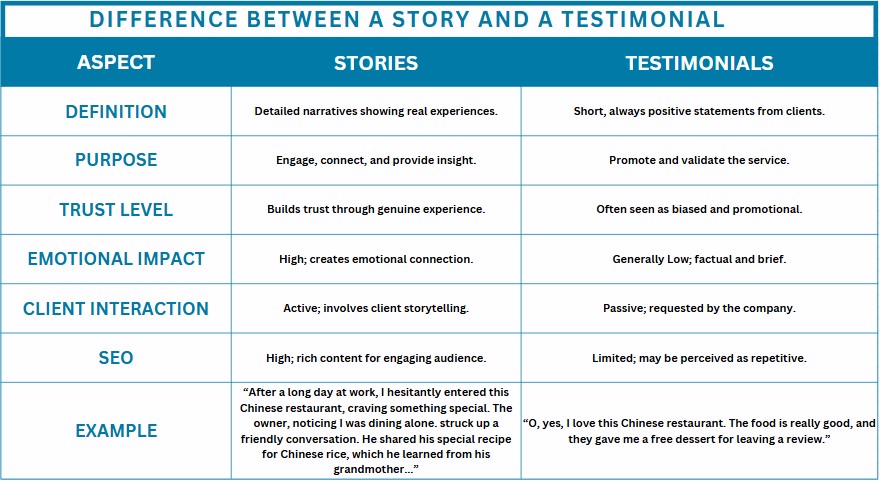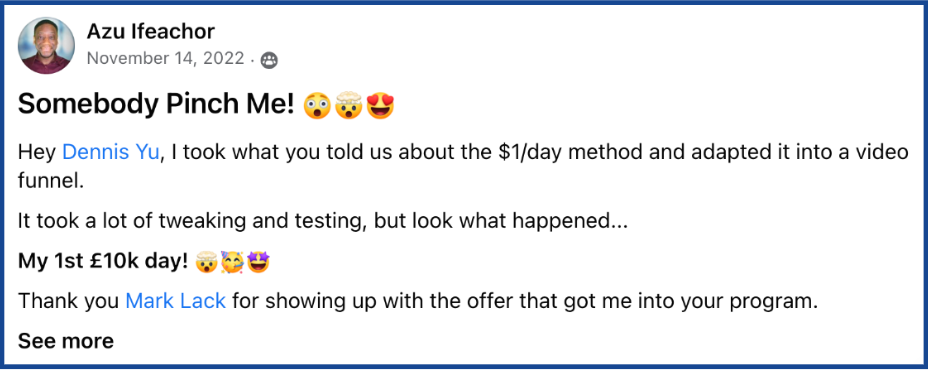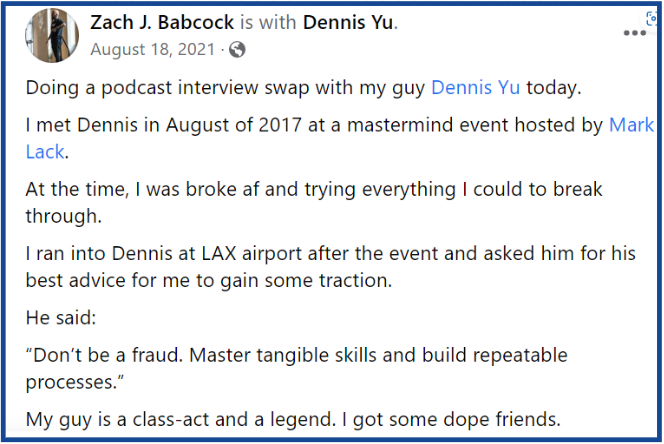
People will pay to hear a story, but who pays to hear testimonials?
When you label something a “testimonial,” you instantly lose trust. The moment you ask someone for a testimonial, you miss the chance to tell a real story.
Instead of having an SEO expert say, “Dennis is great at SEO,” I ask him to share how I helped a client rank. By letting him explain the process— “I wrote articles, posted them, used tools”—he captures my expertise and shows a genuine experience. This is where the traditional testimonial fails. It often sounds like a promotional tool, lacking the depth and authenticity that a story provides.
Stories have unique power—they move people, influence decisions, and create emotional connections. They follow Google’s EEAT guidelines by focusing on real experiences. Stories not only show your expertise but also how you helped clients, building credibility and trust. Sharing real results and experiences makes your brand relatable and trustworthy.

The Shift from Testimonials to Stories
Testimonials have long been used in marketing, but they no longer work as well. They often feel forced, scripted, and promotional. Stories provide a deeper connection. They do more than a review—they let your audience experience the journey, challenges, and real solutions your clients found.
For example, instead of hearing, “Dennis is the best Facebook Ads trainer,” a story shows how Dennis helped someone master TikTok Ads, detailing the process and results. This story engages, educates, and provides real value—key components of Google’s EEAT framework.
Stories let us almost live the experience of the other person, while testimonials feel more extracted—like observing rather than experiencing firsthand.
The Role of LIGHTHOUSE Relationships in Building Authority
To build authority in your niche, elevate LIGHTHOUSE client experiences through stories, showing how your expertise directly impacted their success. This idea builds credibility on platforms like webinars, podcasts, and blogs—where LIGHTHOUSE relationships share their experiences and success stories.
As a digital marketer, I’ve worked with clients like Nike, Red Bull, and the Golden State Warriors. I didn’t land these clients through cold outreach. Instead, I built trust through the LIGHTHOUSE strategy and shared real success stories. Clients come to me because they trust the value I provide.

Recently, I spent the day with Jeremy Newman, a well-known figure in the restoration industry with a $10 million business. After our time together, instead of just saying, ‘Dennis is great,’ Jeremy shared a meaningful story. He posted, ‘I spent a day with my friend Dennis Yu today. He has been extremely helpful in teaching me the basics about the digital world.’
His story resonated with his audience, sparking significant engagement and comments from other restoration contractors who respect Jeremy’s expertise. Since many look to him for advice, his post led others in the industry to reach out for help with their SEO and marketing. Afterward, I received multiple inquiries, which shows how sharing real experiences builds trust and connection.
This proves my philosophy: ‘Do something good for someone important, and they will talk about you.’ That’s the essence of storytelling in marketing. By sharing authentic experiences with industry leaders like Jeremy, I build credibility and attract clients who need similar expertise.
Sharing Stories on the Right Platforms
Sharing client stories on relevant platforms like webinars, podcasts, or blogs boosts credibility and trust. When you frame client testimonials as success stories on platforms where your audience seeks knowledge, you make a lasting impression.
For example, I often invite clients to share their experiences on podcasts, saying, “Hey, I’d love to interview you and elevate your success story.” This shifts the focus from extracting a review to creating a story that provides value to others. By publishing these stories on respected platforms, your authority grows.
How to Turn Client Testimonials into Stories
Now, let’s break down how to transform testimonials into stories. Instead of asking for a testimonial, guide clients to share their journey by asking meaningful questions about their struggles, the solutions they found, and the results they achieved. This method turns shallow reviews into deep, engaging stories that connect emotionally and show your expertise.
Here’s how to do it effectively:
- Set the Right Tone: Instead of asking for a testimonial, invite clients to share their experience on a podcast, interview, or blog. Frame the conversation around their success story.
- Ask Key Questions: Use questions that guide them through their journey:
- What challenge did you face before?
- What solution did you find?
- What results did you achieve, and how did they impact your business?
- Focus on Results: Highlight the real results they achieved, showing both their journey and your role in it. This not only boosts their credibility but also builds trust in your business.

A great example of this is Brennan Agranoff, who didn’t just say, “Dennis’s strategies helped me.” Instead, he shared how he started his sock business at 14 in his garage, used Facebook Ads, scaled it, hired 150 virtual assistants, and grew it into a multi-million-dollar business. His story highlights the journey, the tools, and the lessons learned, which attracts trust and attention far more than a simple testimonial ever could.
Here’s another example: James Charles Phillips shares how he used the Dollar a Day strategy to solve a real business problem instead of just praising a product or service. When clients share success stories like this, they give potential customers a clear example of how a method or service can solve problems quickly and effectively.

By shifting from testimonials to impactful stories, you build lasting trust and showcase your true value. So, when we talk about our services or products, let’s not ask for testimonials. Let’s ask for stories.
Also, read this:
3 Components of Authority | BlitzMetrics
